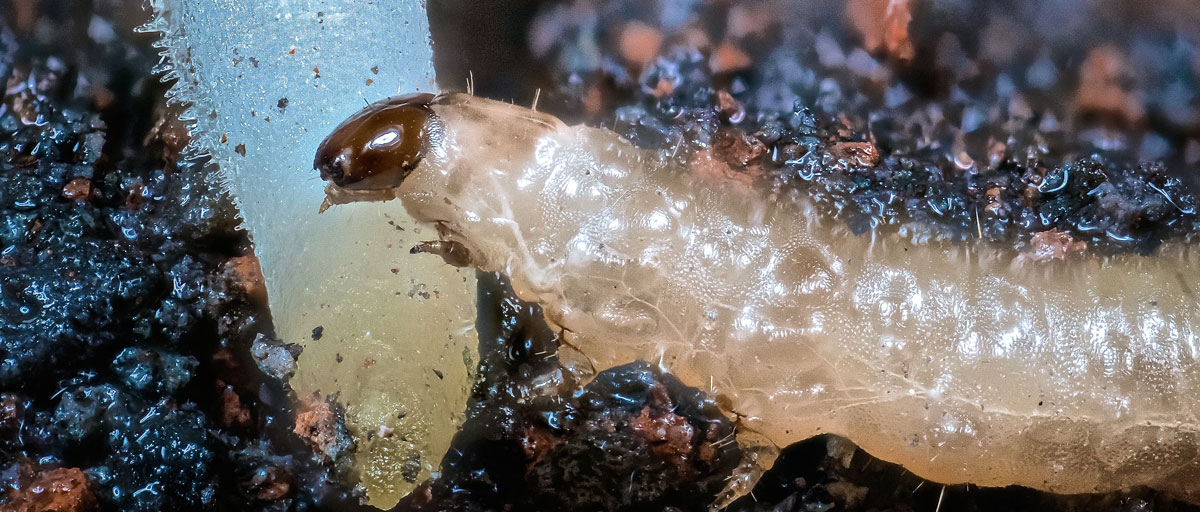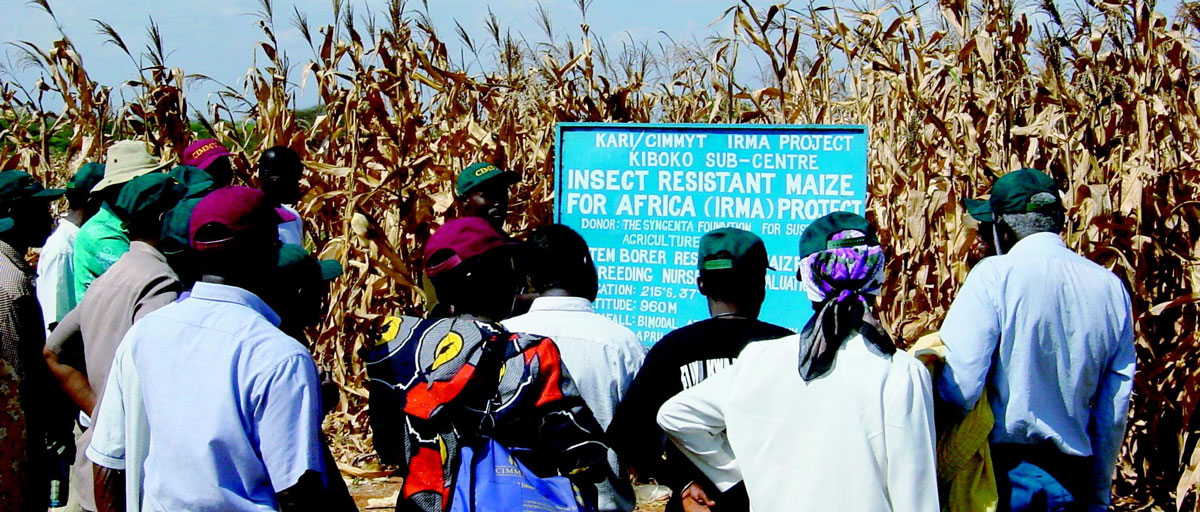Bildtext får vara max två rader text. Hela texten ska högerjusteras om den bara ska innehålla fotobyline! Photo: B. Christensen/Azote
CROP DAMAGE
Crop rotation mitigates pest resistance

In a study published in PNAS, researchers show that by rotating corn, damage to corn fields was significantly reduced. Western corn rootworm larvae can devour the tips of corn roots, robbing the plants of nutrients and making them susceptible to falling over. Photo: C. Hertz, L. Hu and M. Erb/University of Bern
- Researchers evaluate the effectiveness of crop rotation and other tactics for mitigating rootworm damage to Bt corn
- By rotating corn and not planting the same type of Bt corn year after year in the same field, rootworm damage was significantly reduced
- Besides the environmental advantages, financial incentives may be sufficient to increase crop rotation
Why rotating and diversifying crops can help keep the corn rootworm away
MANY A CORN CATCHES THE WORM: Genetically modified crops can reduce insecticide use and provide significant economic and environmental benefits – until pests evolve resistance to them.
Take the western corn rootworm, for instance.
It is one of the most destructive crop pests in North America and Europe. Much to farmers’ dismay, some US rootworm populations have evolved resistance to all types of biotech corn designed to control this devastating beetle. Each type of corn is genetically engineered to produce one or two proteins from the bacterium Bacillus thuringiensis (Bt) that kill rootworm larvae but are not toxic to most other organisms, including people.
Although farmers have planted refuges of non-Bt corn near Bt corn to delay pest resistance, this strategy has proven insufficient.
Crop rotation, growing different crops in the same field across seasons, has historically been widely used for rootworm control.
In 2016, crop rotation was mandated by the US Environment Protection Agency as a primary tactic to address resistance problems, but previously the scientific support for this was limited.
More rotation of corn with other crops could reduce the environmental impact of agriculture and at the same time benefit farmers economically.
Yves Carrière, lead author
Significantly reduced damage
In a study published in PNAS, centre researcher Peter Søgaard Jørgensen along with colleagues from the US and Canada evaluated the effectiveness of crop rotation and other tactics for mitigating rootworm damage to Bt corn.
The authors analyzed field data for 2011 to 2016 from Illinois, Iowa and Minnesota, three states where many Bt corn fields suffered severe damage from this pest.
The results show that by rotating corn with other crops and by not planting the same type of Bt corn year after year in the same field, the frequency of rootworm damage to corn fields was significantly reduced.
The paper states crop rotation provides several additional benefits, including increased yield, control of other pests, and reduced use of fertilizers.
Incentives to increase rotation
Based on their results, the authors believe that besides the environmental advantages, financial incentives may be sufficient to increase crop rotation.
Increasing crop rotation “could be critical for sustaining the economic and environmental benefits provided by rootworm-active Bt corn,” conclude the authors.
Yves Carrière, lead author from the Department of Entomology at the University of Arizona, suggests, “More rotation of corn with other crops could reduce the environmental impact of agriculture and at the same time benefit farmers economically.”
Methodology
The authors analyzed six years of data on the frequency of “problem fields” with severe rootworm damage across 25 crop reporting districts of Illinois, Iowa, and Minnesota. For 2011 to 2016, the authors assessed factors associated with the observed temporal decline in problem fields, such as year, state, precipitation and temperature. They then evaluated the association between problem fields and corn-soybean rotation, among-year variation in effects of crop rotation and corn types on problem fields, effect of resistance to crop rotation on mitigation of resistance, difference in management history between problem fields and all corn fields, and finally, the economic impact of corn-soybean rotation.
Carriére, Y., Brown, Z., Aglasan, S., Dutilleul, P., Carroll, M., Head, G., Tabashnik, B.E., Søgaard Jørgensen, P., Carroll, S.P. 2020. Crop rotation mitigates impacts of corn rootworm resistance to transgenic Bt corn. Proceedings of the National Academy of Sciences Jul 2020, 202003604; DOI: 10.1073/pnas.2003604117
Peter Søgaard Jørgensen’s research focuses on measuring sustainable development in the Anthropocene and developing new approaches to deal with antibiotic resistance









